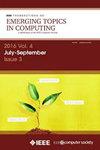基于加权对比学习和伪标签校正的连续测试时间自适应
IF 5.4
2区 计算机科学
Q1 COMPUTER SCIENCE, INFORMATION SYSTEMS
IEEE Transactions on Emerging Topics in Computing
Pub Date : 2025-01-20
DOI:10.1109/TETC.2025.3528985
引用次数: 0
摘要
在涉及由不断变化的环境引起的领域转移的场景中,通常需要实时适应性来保持系统的准确性。虽然已经提出了持续的测试时间适应来处理这种情况,但现有的方法依赖于高精度的伪标签。此外,连续测试时间自适应的对比学习方法考虑了同类特征的聚合,而忽略了同类内相似特征的聚合问题。因此,我们提出了“加权对比学习”,并将其应用于预训练和持续测试时间适应。为了解决持续适应导致的灾难性遗忘问题,已有研究采用源域知识随机恢复目标域模型。然而,显著的领域转移可能导致源领域知识表现为噪声,从而影响模型的适应性。因此,我们提出了“领域感知伪标签校正”,在不访问原始源领域数据的情况下减轻灾难性遗忘和错误积累,同时最大限度地减少对模型适应性的影响。我们在实验中的全面评估证明了我们提出的方法的有效性。本文章由计算机程序翻译,如有差异,请以英文原文为准。
Continual Test-Time Adaptation With Weighted Contrastive Learning and Pseudo-Label Correction
Real-time adaptability is often required to maintain system accuracy in scenarios involving domain shifts caused by constantly changing environments. While continual test-time adaptation has been proposed to handle such scenarios, existing methods rely on high-accuracy pseudo-labels. Moreover, contrastive learning methods for continuous test-time adaptation consider the aggregation of features from the same class while neglecting the problem of aggregating similar features within the same class. Therefore, we propose “Weighted Contrastive Learning” and apply it to both pre-training and continual test-time adaptation. To address the issue of catastrophic forgetting caused by continual adaptation, previous studies have employed source-domain knowledge to stochastically recover the target-domain model. However, significant domain shifts may cause the source-domain knowledge to behave as noise, thus impacting the model's adaptability. Therefore, we propose “Domain-aware Pseudo-label Correction” to mitigate catastrophic forgetting and error accumulation without accessing the original source-domain data while minimizing the impact on model adaptability. The thorough evaluations in our experiments have demonstrated the effectiveness of our proposed approach.
求助全文
通过发布文献求助,成功后即可免费获取论文全文。
去求助
来源期刊

IEEE Transactions on Emerging Topics in Computing
Computer Science-Computer Science (miscellaneous)
CiteScore
12.10
自引率
5.10%
发文量
113
期刊介绍:
IEEE Transactions on Emerging Topics in Computing publishes papers on emerging aspects of computer science, computing technology, and computing applications not currently covered by other IEEE Computer Society Transactions. Some examples of emerging topics in computing include: IT for Green, Synthetic and organic computing structures and systems, Advanced analytics, Social/occupational computing, Location-based/client computer systems, Morphic computer design, Electronic game systems, & Health-care IT.
 求助内容:
求助内容: 应助结果提醒方式:
应助结果提醒方式:


